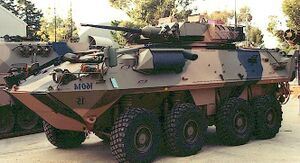IAV-72
| IAV-72 Fighting Vehicle | |
|---|---|
 | |
| Type | Armored Personnel Carrier |
| Place of origin | |
| Service history | |
| Used by | |
| Wars | |
| Production history | |
| Designer | Seratto Defense Solutions, Inyurstan Army |
| Designed | 1985 |
| Manufacturer | Seratto Defense Solutions |
| Produced | 1988 |
| No. built | 6,000+ |
| Specifications | |
| Weight | 17.3t (base combat weight) |
| Length | 7.8m |
| Width | 3.2m |
| Height | 2.4m |
| Crew | 2 (gunner, driver) |
| Passengers | 8 |
| Armor | Welded steel alloy with ceramic plating
|
Main armament | Bushmaster II 30mm Autocannon |
Secondary armament | 7.62x51mm Machine Gun |
| Fuel capacity | 42gal |
Operational range | 620km (internal fuel, road) |
| Speed | 75km/h (road) 20km/h (off-road) |
The IAV-72 Tegu series is a family of armored personnel carriers (APCs) in service with the Inyurstan Army. It is widely used as part of mechanized formations, and serves as the workhorse of the Inyurstan Mechanized Brigade. Since its introduction in 1988, over 6,000 units have been produced, making it the most widely used vehicle in Inyurstan military service behind the Iguana-M2.
Development
Domestic modification and production of the IAV-72 was the first major industrial contract by PavCo Arms. Initially, Inyurstan commanders wanted just a light, well-armored vehicle to carry responding troops across dirt roads, waterways and disjointed tracts of grassland and rural farmland quickly in the event of an insurgent attack or enemy incursion.
The first model of the IAV-72 was debuted in 1986, and entered service in 1988. Shortly thereafter, the military began reorganizing itself towards a more expeditionary direction; and the Mechanized Brigade became the mainstay modular unit of the Inyurstan Army. With it, the IAV-72 production increased threefold, and the vehicle found itself as one of the primary war machines of the new Inyurstan combat structure.
Design
Originally based off the MOWAG Piranha IIIC, the IAV-72 is an 8x8 wheeled APC platform. It is armored with domestically welded steel alloys and added ceramic plating to provide protection up to 14.5mm from the front and sides.
The primary armament is a 30mm Mk44 Bushmaster II cannon, capable of 100-200 rounds per minute sustained fire. Multiple types of ammunition, including high-explosive and armor-piercing discarding sabot rounds can be used. Additional armament includes a coaxial 7.62mm FN-MAG machine gun for quick engagement of infantry targets.
All versions of the IAV-72 are considered amphibious in regards to most riverine and lake systems; although additional buoyancy/floatation devices must be equipped to operate in sea conditions or high-velocity riverine systems.
Combat
The IAV-72 Tegu and its variants have seen use in every major conflict involving the Inyurstan Army.
Variants
IAV-72 "Tegu" APC
As the primary asset of mechanized infantry units, the basic armored personnel carrier variant of the IAV-72 is the most common and widely used. The Inyurstan National Guard uses the IAV-72E2 for domestic duties, one of the few non-"hand-me-down" pieces of equipment in their stockpiles.
Sub-variants:
- IAV-72M: Fitted with slat armor and basic night-vision equipment.
- IAV-72M2: Improved survivability variant adding Hailstorm APS and AN/VLQ-6 electronic counter-measures to the M-models.
- IAV-72M3: Mainline variant fitted with ERA and Hailstorm APS. Improved night vision optics, FLIR gunsights, and 30mm RWS.
- IAV-72M2: Improved survivability variant adding Hailstorm APS and AN/VLQ-6 electronic counter-measures to the M-models.
- IAV-72L: Down-armed airborne version with .50cal remote weapons system (RWS) and active camoflouge.
- IAV-72L2: Added new FLIR gunsights, night vision-optics and Hailstorm APS and AN/VLQ-6 electronic counter-measures to the L-models.
- IAV-72E: Export variant armed with manned .50cal turret.
- IAV-72E2: IAV-72E with added ceramic plating to increase frontal protection to 23mm and side protection to 14.5mm.
- IAV-72E3: Added night vision-optics and (Nijonese APS) and (Nijonese ECM) electronic counter-measures to the E-models.
- IAV-72E2: IAV-72E with added ceramic plating to increase frontal protection to 23mm and side protection to 14.5mm.
IAV-74 "Carcujo" MGS
A distinct member of the IAV-72 family is the IAV-74 "Carcujo" Mobile Gun System (MGS). Armed with an M68 105mm cannon and a single coaxial 7.62mm FN-MAG, the IAV-74 is designed to provide heavy fire support to infantry, and engage havier armored vehicles including IFV's, APC's, light tanks and 2nd-Generation MBT's. The IAV-74 is organized into mechanized brigades similar to the YT-1 Light Tank; however, it lacks the armor of its tracked cousin, leading crews to refer to it as a "glass cannon".
It is named for the Carcujo, an armored lizard found in the flooded forests and swamplands of Inyursta.
IAV-72CT ATGM Carriage
"Contré-Tanque" version including a x2 GPM-T launcher atop a remote weapons system (RWS) mount with a single .50cal MG for self-defense.
IAV-72AD "Tarantula" FAAD
Forward-Area Air-Defense (FAAD) consisting of a x2 FIM-92 Stinger launcher paired with radar-directed twin RK-25 autocannons on the chassis of an IAV-72. Includes a self-contained tracking & fire control radar in addition to a FLIR gunsight. Radar range is roughly 15-20km for detection of 3m2 aerial targets. The IAV-72AD serves as the primary FAAD unit for Inyurstan mechanized infantry brigades.
Others
CAV-75 CBRN Response Vehicle
MAV-73-120 Mortar Carriage